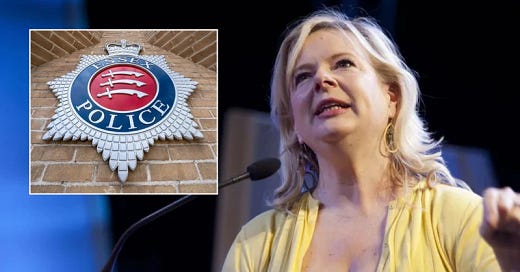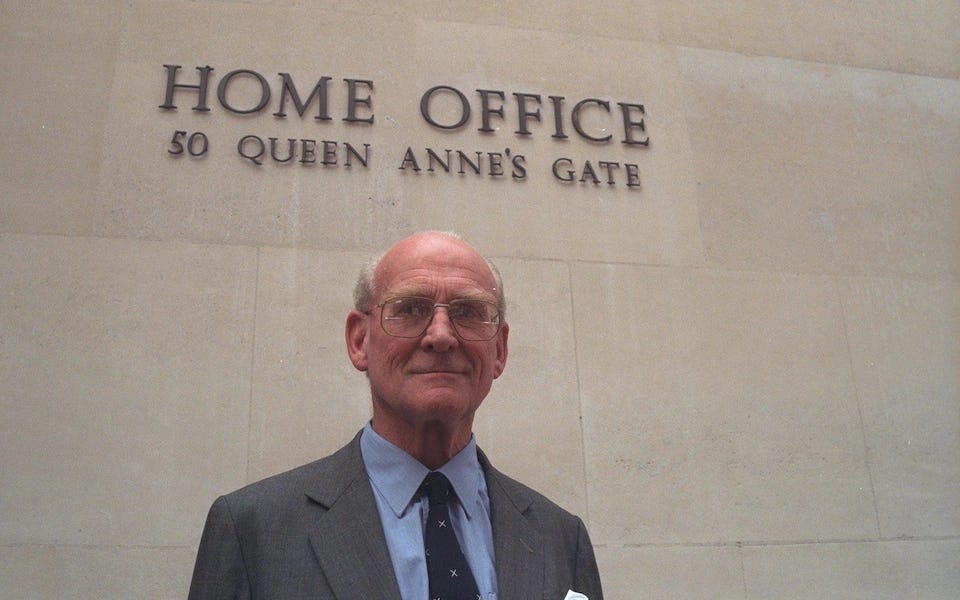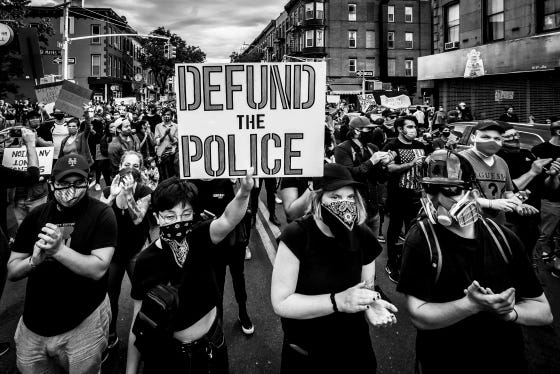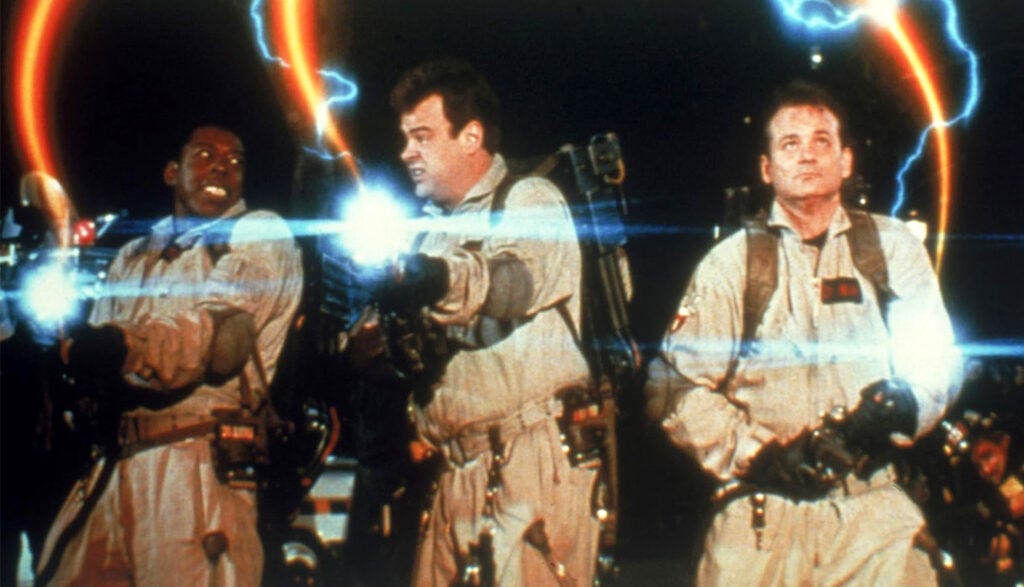When will the Police ever learn?
Hello. I’m here, as promised. I’m like the baddie in an 80’s straight-to-video horror movie who JUST WON’T DIE.
I was summoned back to Substack by the drama surrounding the journalist Allison Pearson (disclaimer: I’m a fully paid-up member of the FSU). Yet again, the police are clumsily tying themselves in knots around ‘hate speech’ and freedom of expression. This time they’ve wandered into battle, like a Hi-Viz Don Quixote, against (as Mark Twain put it) ‘people who buy ink by the gallon.’
As Homer Simpson might say, Doh.
This stuff falls broadly into my old policing grid square. I’ve also, er, investigated journalists (you can read about it here). If you aren’t familiar with Allison Pearson’s story, it goes something like this;
Ms. Pearson is a right-of-centre journalist (so right-wing, I remember her endorsing that populist hardliner Penny Mordaunt as leader of the Conservative Party). A year ago, during the tumultuous period of online sparring over Gaza, she re-posted a tweet. The tweet was inaccurate and, an hour or so later, Ms. Pearson deleted it. I’ve seen the alleged post. In my humble experience, it isn’t actionable and unlikely to pass the CPS charging threshold.
I would also mention the many social media posts I saw supporting Hamas (a proscribed terrorist organisation) at the time. This is the stuff allegations of ‘two-tier’ policing are made of. Read my take on that here.
Then, on Remembrance Sunday, two coppers appeared at Ms. Pearson’s door to inform her she was under investigation for either (a) a notorious Non-Crime Hate Incident (NCHI) or (b) an offence under s.17 of the Public Order Act (i.e. publishing or distributing material encouraging or likely to encourage racial hatred). This is disputed, but Essex police assure us they’ve body-worn camera footage proving they never mentioned a NCHI. To be fair, I suspect Essex police are correct - an NCHI wouldn’t require a police interview. On the other hand, given the infamy of NCHIs, I wouldn’t blame Ms. Pearson for the mix-up either.
The officers asked if Ms. Pearson would confirm a date to attend a police station for said interview. They failed to inform her precisely what the tweet was, or the identity of the complainant (although they used the term ‘Victim’). There are legal reasons for this, but police officers not explaining procedure is pretty par for the course nowadays.
I suspect the ignominy of two coppers turning up in person at a journalist’s door, on a Sunday, to enquire about a year-old tweet is a significant part of the story. People don’t see coppers from one year to the next, especially out in rural Essex where Allison Pearson lives - notably if they report a burglary or a car break-in. But an ancient tweet that might have offended someone?
Form a squad.
Although, in fact, it was probably an appointment car using a quiet Sunday morning shift to offload someone else’s admin, but as I said before the police tend not to shine when it comes to explaining themselves. Someone with their head screwed on, a moderately intelligent supervisor, should’ve looked at the crime report (in my opinion, they should have hit the No Further Action / LOB button) and thought, ‘hmmm a respectable journalist with no previous convictions. Someone should ring her on Monday morning, explain the situation and ask her in for interview.’
Would that have killed the story? No, of course it wouldn’t. Would it have taken some of the heat out of it? I suspect it might have. Something I learned working on the telephone-hacking saga? The process is the punishment. It’s occasionally difficult to see that as a police officer. It’s just procedure, right?
Anyway, even Keir Starmer (I suspect through gritted teeth - he’s a career Human Rights aficionado) commented on the story, suggesting the police should get a sense of proportion. So this isn’t an issue where only one side of our dull-as-ditch water culture war are upset. Julie Bindel, a lifelong left-of-centre radical feminist, had a police visit for her views on trans issues. In that case, the complainant was from Holland. I wonder if the Dutch police forwarded the allegation? I doubt it. This is bullshit. I’m Generation X, so I’m probably showing my age here.
Personally, I find the social media landscape full of foaming-at-the-mouth bloviators of every political persuasion. (1) I, generally, defend their right to free speech and (2) neither Allison Pearson or Julie Bindel even begin to feature on my list of foaming-at-the-mouth bloviators. They’re both legitimate journalists and commentators.
And here we are. If the police aren’t trigger-happy, extra-judicial killers, they’re woke snowflakes or sinister Stasi wannabes. How did they get so hung up on NCHIs rather than NHCIs (Non-Hate Crime Incidents, my new term for non-subjective offences like burglaries, assaults and robberies)?
The late Sir William MacPherson of Cluny.
I find myself spirited back to 1999, shortly after the publication of the Macpherson Report. MacPherson had just concluded the Met suffered from Institutional Racism; the service was in a flat spin. We all knew something had to change. It really was a watershed moment.
I also remember the atmosphere among senior officers at The Yard, the palpable sense of Do Something. Now! The panicky, ‘form a squad mentality’ that often bedevils policing. A magic solution, one allowing the Met to go to the Home Office and deliver repentance on a silken cushion.
At the time, I was serving in Special Branch. We’d been given the job of collating stats, 24/7, for a newly-formulated racial incident response. Our Scotland Yard Reserve Room’s old MSS printer (oldies - remember those?) churned out reams of paper as police officers dutifully reported incidents meeting the nebulous MacPherson criteria; [a] racist incident is any incident that is perceived to be racist by the victim or any other person.
Perceived. Any other person.
Some complained this was a charter, albeit well-intentioned, for those seeking to score points for political or personal reasons (although to suggest such heresy was frowned upon). We knew this would happen. And it did.
The printer whirred. The latest report arrived, from a suburban police division; a member of the public complained she’d overheard one child calling another a ‘poppadom’ in a school playground. Yes, something you’d expect a teacher to deal with was now reported to Special Branch. It was duly logged, added to the statistics one side or another would use to justify strategy ‘a’ or policy ‘b.’ And, most importantly, for the Met to prove the police were doing something about an seemingly intractable societal problem.
That was in 1999. Millions of words have been written about racism and policing since. We’re now at a point where the ratchet only moves one way; campaign groups such as BLM have made millions arguing for the police to be disbanded. Marxists, disinterested in property rights? Never.
The US experience - crossing the Atlantic like flu. How’s that working out, Minnesota, California and Oregon? Did you lose an election, perhaps?
English and Welsh law concerning ‘hate speech’ is covered by a number of overlapping pieces of legislation. There’s a textbook to be written about this, but not by me – my posts tend to be long enough already. What I will say is the Public Order Act 1986, especially s.4 and s.5 (concerning threats / insulting words and behaviour) needs rethinking, along with s.17. Indeed the entire body of law probably requires codifying.
Or perhaps not.
Can you imagine the result? An orgy of Human Rights lawyers, like sharks in a tank full of offal? We’d end up like North Korea, but run by David Brent.
Then there’s the corpus of self-serving academic work concerning hate speech, which isn’t at all biased, honest guv’nor. To deliberately misquote Brendan Behan, ‘I’ve never seen a problem an academic couldn’t make worse.’ The more I read this stuff, the more I detect the heady aroma of problem-creation-to-justify-my-next-research-grant. More hate = more conferences, books and warm fuzzies. If the 20th Century was all about the ‘Military – Industrial Complex’ then the 21st surely belongs to the ‘Academic – Grievance Culture Complex.’
I remember a decade-old police NCALT distance-learning module on Sexism. Distance-learning is totalitarianism on the cheap - you’re required to indoctrinate yourself. Apparently, one minute you’re calling a female colleague ‘love.’ Then, soon afterwards? The world’s gone all ‘The Handmaid’s Tale.’ As the old meme goes, ‘that escalated quickly!’
As someone who worked as a domestic extremism investigator for nearly eight years, I found it risible. You know, the kind of extremism involving rioting, arson, intimidation, the vilest sort of racism, Blood and Honour music, violence, vandalism and (yes) terrorism.
And so, behold Allport’s infamous ‘pyramid of hate’, the 1950s survey of refugees from the Second World War that forms the basis of police NCHI policy. It’s the pyramid I saw in that distance-learning package all those years ago. Critics argue it’s evidence-light in a modern law enforcement context, but think about The Vibes. Ex-cop Harry Miller certainly persuaded a court that was the case.
But what would I know? Well, as someone with relatives who perished in concentration camps, I consider the College of Policing definition of what constitutes ‘hate’ insulting and increasingly one-sided. However, let’s hear the argument, because I’m a grown-up. Nobody has the right not to be offended.
Allport’s scale of prejudice - remember, your next angry tweet might be only four steps away from Genocide.
With this in mind, are Non-Crime Hate Incidents really nothing more than an oppressive construct, invented by our New Establishment overlords to make themselves feel virtuous? Perhaps, although I’m sure they believe they’re on the side of the angels. I also think NCHIs are part of MacPherson’s legacy and the long march of critical theory in academia and, from there, into our institutions.
Contemporary hate crime allegations are also potentially oppressive because ‘the process is the punishment’ (i.e. being investigated and the administrative grind that entails, not to mention the cost of legal representation). Your name is also added, in the case of NCHIs, to a state-sanctioned shit-list.
Conveniently, though, the modern iteration of hate crime happens to dovetail nicely with other theories fashionable in modern policing; for example Performance Management and ‘Harm Reduction.’ Let’s not even start on the shadow puppetry I witnessed being used by the police side of PREVENT (interventions, anybody?). If you know, you know.
Solving crime is tough, often unrewarding and occasionally risk-laden. Not to mention expensive and resource intensive. On the other hand, escaping operational policing to invent a ‘toolkit’ to prevent fashionable new offences (for which you’ve created an entire performance empire)?
Genius.
Feed the monster. Populate the spreadsheet. Ace the promotion board. Senior coppers are like mice - they simply follow the cheese, however ridiculous the maze.
NCHIs and the like are a symptom of the virus infecting our public services (quite a few of my posts are read by people working in the NHS, who tell me their experience is similar to mine). One of overt politicization, groupthink and grinding, process-obsessed managerialism. The death of discretion. The fact this is, ostensibly, designed to make people ‘nice’ to each other is neither here nor there.
Why?
In case you haven’t noticed, the more hate speech laws we create… the more resentment seems to fester. People don’t like being bullied or told what to think. Especially not by the Old Bill.
At the Essex police Gold Group, the Chief Constable and his team might find themselves hiding behind a shield wall of policy, best practice, College of Policing diktat and virtue-signalling. I wonder if they ever ask themselves a simple question - why are we even bothering with this bullshit? Do the taxpayers of Essex want us to spend our time on this stuff? Why don’t we just concentrate on, you know, policing?
It’s because, whatever Keir Starmer might warble about proportionality or commonsense, the ghost in the machine is whispering something else in senior officers’ ears. And until that ghost is exorcised… nothing will really change.
They ain’t afraid of no ghosts. Send them to the College of Policing. Please.
I’d just like to say thanks to all of the people who sent their best wishes after my last article. I’m slowly getting better, thanks. I’ve got a new book being looked at by publishers and I’m now writing my first police thriller. Watch this space.
Until next time,
Dom









As someone a number of whose relatives were also wiped out in the camps, I agree with your thoughts. I am currently in Kanchanaburi, Thailand, visiting the Death Railway and the Bridge on the River Kwai.
Walking around the Commonwealth War Graves Cemetery and the Death Railway Museum has enabled me to reset my priorities of life and my opinions on what is and what is not important. Those young people in the cemetery did not have that opportunity.
Tweets are not important and people using social media need to develop some backbone.
The police need to return to keeping people safe and preventing and detecting crime, especially the ordinary stuff that affects many peoples’ lives, not the esoteric things that no one really cares about. If the public see this happening, they will fall back in love with the police, who will be supported rather than being attacked and abused.
It’s not rocket science and time senior officers realised it.
Welcome back Dom. I’m a man of my word, so I’ve put you down for that less than eight. If you promise to stay around, I can offer you any of the bank holidays you want over the Xmas and New Year period…